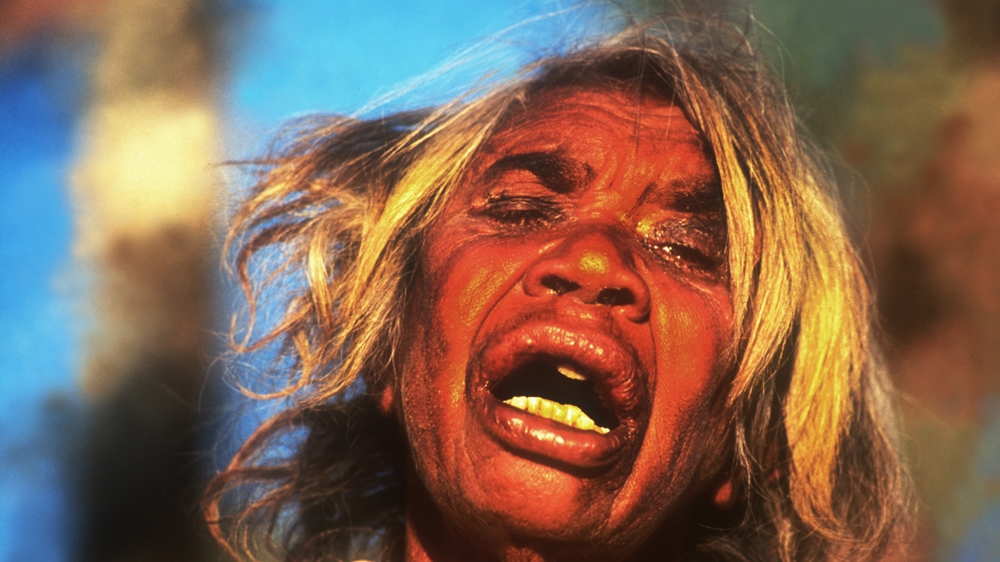
The heat was oppressive and crushing; the kind that has claimed countless lives in Australia's dead heart.
The birds had stopped singing and instead sat silently in the branches of the river eucalyptus trees. The leaves shielded us from the sun's cutting rays.
Around me in the dried up riverbed were clusters of Aboriginal men, women and children mumbling in low fatigued tones.
The men sat apart from the women. The riverbed was strewn with empty wine casks and beer cans. The children were peppered randomly around the dry riverbed. They sat on empty cardboard beer cartons playing with torn cigarette packets and drinking the dregs of left-over alcohol from cans discarded by their parents. Flies crawled over their faces and tunnelled through their hair.
I recall thinking to myself that it resembled another country, well more accurately, another planet.
It was not the country that I grew up in. I waited for it to come. And so it did. The guilt. Following the guilt there was the shame, the despair, and then the anger. After that the self-questioning began. How could Australia's indigenous people be reduced to such desperation and bleakness? Why is it like this? What was my role as a white Australian in what was before me? How am I responsible? Can I do anything to help? A sense of helplessness followed. And after that I simply did not feel anything.
READ MORE: Armed with a camera
I had asked myself such questions many times before. Sometimes they would cause a flood of emotions, leaving me feeling overwhelmed. It is confronting to see people in such dire circumstances - especially when you have a shared experience with those in question.
In reverie, I reflected on how I grew up in a rural outback town in Australia. I had fond memories of being cared for by an Aboriginal nanny called Ilene. She loved me, and I loved her back. I vividly recall at the end of each working week my father putting Ilene and me in his big 1966 Chevrolet car and driving us out of town. The straight sealed bitumen road soon turned to dirt and a huge cloud of dust streamed behind us. We drove "down the track" to drop Ilene back to the "mission" (Aboriginal settlement) to be reunited with her family and friends.
The Aboriginals I co-existed with worked on the family farm, they were in town, and I went to school with their children. They were part of my world or, more accurately, I was part of theirs. I understood - in part - the complexity of their "dreamtime" (Aboriginal myths and legends) and deep spiritual connection and affinity with the land. The "land" (Australia) was and remains sacred to the Aboriginal people, and they are its rightful custodians.
But then my reverie returned to the grim reality of where I was: sitting on the dried up bed of the Todd River outside of the town of Alice Springs in desert Australia.
I had been sent there by a major Australian magazine to document alcoholism among Aboriginal people. It was and remains a contentious social issue in Australia; a political and philosophical minefield of sorts. Sitting beside me was 'Nancy' (the woman in the photograph). Nancy was shy but curious and had come over to talk to me.
She was probably in her mid-30s, but her life-ravaged face suggested a woman much older. She was slight, willowy and somehow fragile. She spoke to me in English but at times slipped back into her local desert dialect - Arrernte.
Our conversation revolved mainly around our shared curiosity about each other's family, friends and place - where we are from. These things connect us and confirm that we are all in this together no matter what the colour of our skin. Nancy was engaging and bright, and our conversation served as a respite, softening the harshness of our situation.
The speed was breakneck. I did not see the first blow, but I heard the sickening sound of the delivery as it met its mark. I did see and feel the swoosh of air around me when the second blow rained down on Nancy. I heard her begin to wail.
Her crying and anguish wounded me. As her assailant screamed abuse at Nancy and readied himself to continue beating her with a hard and heavy tree branch, I jumped to my feet, scooped her up and pulled her out of his reach.
In shock, I stood between a heavily drunk Aboriginal man in the midst a violent alcoholic episode and a wounded and weeping Aboriginal woman. Soon after I made this photograph of Nancy, I bundled her into my car and drove her scores of kilometres away to a "dry" Aboriginal community, in the hope that she would be in a safe place.
Photographers documenting war, social issues and famine are sometimes faced with the dilemma of either making the photograph or helping someone. In effect, in this situation I did both. I intervened, and when it was safe I made this photograph of her minutes after the event.
This photograph means a lot to me. But I find it painful to look at now. It re-opens the original emotional wounding that went into the making of it. And even though that was 20 years ago, the alcoholism and the violence that accompanies it remains rampant in Australia today. Aboriginal people are still on a collision course with white Australia and vice versa. There has been little, if any, improvement in the plight of Australia's indigenous people.
My profound wish is that this were a historical visual document for "what has been". Tragically, it is more a metaphor for 'what is now'.
This article first appeared in the Al Jazeera Magazine.







